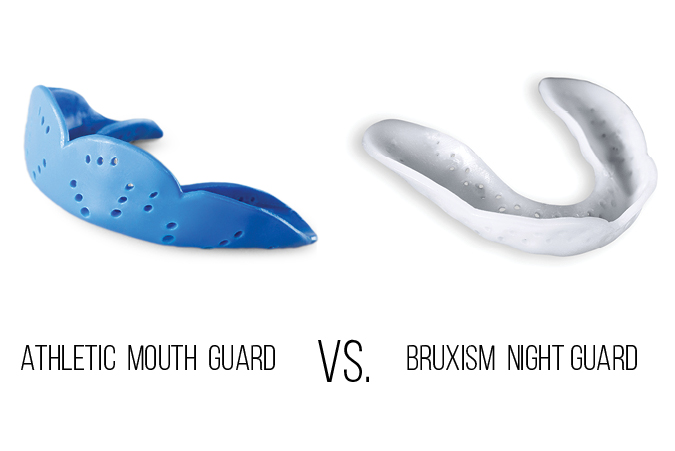Posted by Amy McGlaughlin, RDH PHDHP on Jul 6th 2018
Why You Shouldn't Wear a Sports Mouth Guard for Bruxism

If playing a trivia game show and the host gives the hint, “Tooth protection...” There’s a pretty good chance the contestant would shout out the answer “...mouth guard!” Researchers estimate 60 percent of the population experience rhythmic jaw movements during sleep, some resulting in potentially damaging tooth to tooth contact (clenching or grinding, also called sleep bruxism). Based on the quick answer during the trivia game, it seems logical that someone may buy a mouth guard as a first line of defense to protect their teeth. Many of us grew up using mouth guards when playing sports and we all see famous athletes use them for tooth protection. Why not just buy a mouth guard to protect our teeth from the chipping and wear than could result from sleep bruxism? Not so fast! I wish it were that simple. Let’s take a look at some of the more basic differences between athletic mouth guards and night guards.
Intended wear-time
An athletic mouth guard will most likely be worn for just an hour or two here and there during games, practice, workouts, etc. A night guard will be worn throughout sleep, for approximately 8 consecutive hours 7 days a week. Revisit your long ago (or maybe not so long ago!) science lessons. Remember what happens in a warm, dark, moist environment? Bacteria will thrive and multiply like wildfire, which ties very directly into my next difference. I wouldn’t want my gums stuck in a bacterial breeding ground all night, and you shouldn’t either!
Coverage
Athletic mouth guards are designed to protect the crown of the tooth above the gum line as well as the junction and root of the tooth below the gum line. Basically, a sports mouth piece will cover the teeth and gums (gingiva), whereas a night guard need only cover the teeth and most importantly their biting surfaces. Gum tissue is easily susceptible to irritation and inflammation. Having bacteria trapped against our gingival tissues for the entire duration of sleep could be very harmful to our gum health. Throughout a night’s sleep, increasing bacteria levels would be surrounding the gums. Doing this repeatedly would most likely lead to gingivitis and possibly even gum disease (periodontitis). Periodontal disease cannot be reversed and could even lead to tooth loss. Nature’s mouthwash is our very own spit! Salivary flow will continually wash our teeth and gingiva. This natural cleansing ability buffers the pH in our mouth (preventing decay), and keeps germ growth in check. If any moderate to full coverage appliance is being worn, this natural cleansing system is hindered greatly. A mouth guard or night guard with perforations (holes) is best because saliva can flow more naturally, and sips of water may be even be swished to help cleanse the teeth and gingiva, reducing that nasty colonization of bacteria.
Thickness
Another important size difference between protective sports mouth guards and therapeutic night guards is that an athletic mouth guard is most often quite thick (with exception of some really innovative, newer mouth guards). It would not be wise to “prop” your bite open several millimeters for hours upon hours each day. This altering of the bite for so many hours (during sleep) could lead to significant jaw pain, headaches, and long-term occlusion (bite) issues.
So, to the clenchers and grinders reading - please stick with an oral appliance specific to night bruxism. To the athlete readers - please use your athletic mouth guard for athletic endeavors only. If you are an athlete who also suffers with bruxism, you will want to use two different guards specific to each cause. The purposeful design differences protect in very different ways. No matter what your need may be, as a seasoned dental hygienist, I’m just thrilled you’ve read this in the interest of protecting your pearly whites and oral health!
Amy McGlaughlin, RDH PHDHP
If you’d like to read more about sleep bruxism, take a peek at my piece from a few months ago. The article dives into the possible “whys” for night grinding, and the steps you should take to be properly diagnosed.
